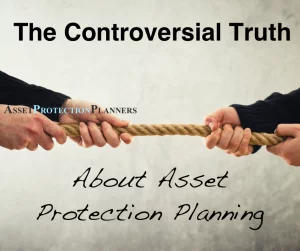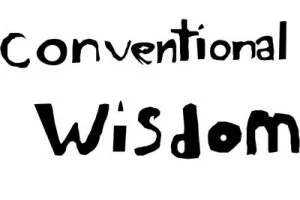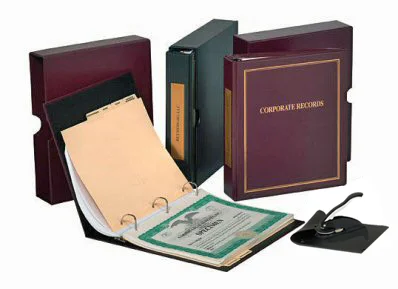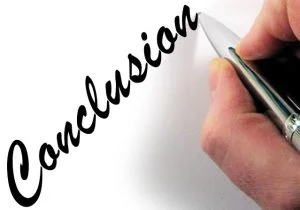
There are those who view asset protection planning with skepticism. They think that others have moral obligations to pay their court-ordered debts. If a judge says they have to pay, they argue, they should strip their bank accounts bare, turn over their dwelling places, their vehicles, take the shirts off their backs, and live in the streets with their private parts covered with fig leaves until they pay their debts.
Examine the facts, however, and that perception may change. Look how many 5-to-4 decisions there are in the 9-member supreme court. A judge who rules one way could just as easily have ruled another. Judges are human beings just like you and me. Like you and me, they are subject to external pressures that may influence objectivity.
Supreme Court Justice Antonin Scalia said, “A creditor has no cognizable interest in the assets of a debtor prior to obtaining a judgment. Anyone can transfer their assets all day long until the sheriff shows up with a Writ of Execution pursuant to a court order.”

Is Asset Protection Immoral?
I’ve heard the weakest arguments against asset protection from lawsuits. “If someone says you owe money, you should just pay it.” “Asset protection is thumbing your nose at the judiciary,” and so on.
What if this was your money we were talking about? What if your opponent got up on the witness stand and lied until he was blue in the face? What if the judge believed him? Are you going to feel all warm and fuzzy about emptying your bank account for the benefit of a deceitful fabricator? Of course not.
Moreover, if you are a US person driving a Toyota, are you “thumbing your nose” at the American autoworker? No. When you buy a Toyota, you’re not really thinking about your thumb or your nose. You may choose a Toyota because you feel it meets your needs better than the other available options. We live in a free country. We get to choose which car best suits our needs; how we spend our own money. If you feel that a Honda serves your needs better than a Chevrolet, that’s your choice.
You get to do with your own money as you please, within legal boundaries. You have auto insurance. You put on your seatbelt. You lock your door at night. You do all of these things to protect yourself and your valuables.
Likewise, maybe you feel it best serves you to keep your money in an international asset protection trust. You decide that if you leave your money back home it will vanish in a lawsuit. Again, it’s your money; your choice. After all, we don’t live in communist North Korea. We have freedom to do what we want, under the law.
A Case for Asset Protection
I have been in the asset protection business for over 30 years. So, I can personally attest that a close decision could be swayed by whether or not the judge and one of the attorneys happen to play golf at the same country club. One attorney we know invites several judges and other attorneys to his house each year to watch the Super Bowl. Another attorney has a judge as a fishing buddy. It is up to a judge’s discretion whether or not to recuse himself from a case.
Still another lawyer and his wife take regular vacations with another couple, one of which is a member of the judiciary. Yet another we know is the son of a former law partner of the judge before which he tries cases. Still another attorney was the law clerk (assistant) to the judge.
Judges are not emotionless robots that make decisions based on pre-programmed inputs. They have good days and bad days. Flat tires and birthday parties. The doctor just diagnosed the judge’s wife with cancer. His 15-year-old Golden Retriever named Drake died last night. The roof in her house has a serious leak. His court secretary’s baby got sick and couldn’t make it to work, leaving him overloaded. These personal relationships and life circumstances can readily alter judicial outcomes.

Rising Tide of Litigation
This is not to mention the ever-rising number of lawsuits. A noteworthy example is the predatory behavior of businesses that file lawsuits to stifle competition. Cisco sued Innovatio IP Ventures, for example, forking out over $13 million in legal fees to attack its competitor over a patented product that ended up being worth a mere 10 cents per device. They spent five times what they ended up settling for. They didn’t care. The lawsuit was an attempt to squash a competitor.
“Patent trolls take advantage of loopholes in our patent law to extort small businesses and make a quick buck,” said US Senator Amy Klobuchar. “The explosion of frivolous patent lawsuits punishes innovators and drives up costs for consumers, which is why we need legislation that will crack down on bad actors while preserving patent rights that are vital to innovation and competition,” she added.
Moreover, defendants face ever-broadening theories of legal liability. Often, one person sues another because the plaintiff sees the defendant as “person of substance.” Likewise, the Robin Hood judge rules against the defendant because it appears that it would be “easy” for her to pay. Besides, and the poor, pitiful plaintiff is such a nice person and could use a helping hand from the rich business owner.

What We Are Covering
- We define “Asset Protection”
- Whatever asset protection you now have is probably not adequate.
- It is perfectly legal, moral and ethical to protect your assets from current and future creditors, unscrupulous attorneys, and con artists who manipulate the legal system for their own benefit.
What is the Definition of Asset Protection?
Asset protection (also known as debtor-creditor law) is a legal means used to shield personal and business resources from civil judgments. The objective of asset protection is to shield wealth from the demands of creditors without perjury or tax evasion.
Asset protection is a sensible and warranted part of financial planning. People employ asset protection plans help to protect their hard-earned wealth before or in the presence of a legal threat. Naturally, the earlier you put such a plan into place the better.

Why Do I Need Asset Protection?
One substantial benefit of asset protection is that it puts one in a position of strength when negotiating a settlement. Plus, we have seen countless instances in which it has prevented litigation in the first place. We have even seen plaintiffs drop cases midstream when they come to the stunning realization that they will be stuck with a pile of legal bills and nothing to show for it.
Conversely, asset protection planning is not about evading taxes, secretly shifting assets to family members, or defrauding others.
Asset Protection Tip: You can best defend your plan when you established it well in advance of a claim. Building a fortress when bullets are flying doesn’t go quite as well as establishing the structure before the onset of war. There are still effective ways to protect oneself after a claim has arisen. However, pre-planning trumps last-ditch efforts.

Why Conventional Asset Protection Often Doesn’t Work
Almost everyone has engaged some form of asset protection plan. The most familiar types include insurance: car insurance, fire insurance, an umbrella policy, malpractice, health, etc. The sad fact is that such insurance can actually increase the chance of a lawsuit, not decrease it. “We can collect the insurance money plus a whole lot more,” a contingent fee attorney says.
Increasing competitive pressure to decrease rates fuel the prevalent exceptions written into today’s insurance policies. Plus, if the plaintiff raises the “fraud” word in the filed complaint, justified or not, the insurance company will usually tuck tail and run, refusing to defend the case or pay any proceeds.

Companies
Other prevalent asset protection tools include the use of corporations and LLCs to separate business liability from personal. If properly established and maintained, a corporation may protect personal assets from a business lawsuit. But take your spouse out for dinner on a Friday night and rear-end somebody. Then that same somebody sues you for more than your insurance covers and you have another problem.
When someone sues a corporate stockholder, the shares of stock and the assets inside may be taken away. If the principles did not adhere to the proper formalities, such as minutes for meetings, resolutions, etc., his opponents may pierce the “corporate veil.” Thus, his creditor may rip the shareholder’s personal assets from him in the event of a corporate judgment.

Statutory Asset Protection
Lastly, some states let its citizens shield assets through various forms of ownership. “Tenancy by the Entirety” comes to mind. The homestead exemption of a primary residence is another. But what if one spouse dies suddenly? What if both spouses have a judgment rendered against them from the same creditor? The asset protection may disappear. Retirement assets, such as IRAs and 401(K)s might enjoy some protections. See IRA Creditor Protection by State.
The value, size and location of a personal residence affects the homestead protection. Even homestead laws in Florida, considered generous, can go out the window if the home is in a city and sits on one more than one-half acre, or may be severely limited if one is forced into bankruptcy.

Asset Protection Tip
Asset Protection Tip: Though the protection is limited, it is still wise to use conventional asset protection to supplement your master plan.
- Though it won’t protect you from all risk and the protections are limited, have adequate auto, home, health, and other appropriate insurance.
- Use limited liability companies to protect against a business lawsuit, and help to protect business assets from seizure in a personal lawsuit.
- Take advantages of various forms of ownership, such as Tenancy by the Entireties for married couples, in states that offer them. The title document should clearly specify tenants by the entirety and not joint tenancy.
- Be knowledgeable of the assets that are exempt from judgment creditors in the state in which you reside. Know the extent to which your state laws protect you, and take measures to protect yourself beyond these limitations, if needed.
Asset Protection is Moral, Legal and Ethical
Properly done, asset protection plans are perfectly moral, legal and ethical. There are perfectly lawful mechanisms that can employed to protect assets in a manner that coincides with ethical protocol for professionals and their clients. We might add that these tools should be put into place in by members of the public and their counsel as an act of prudence, principle and sound fiscal judgment. In a country with 4.4% of the world’s population, 70% of the world’s lawyers and 96% of the world’s lawsuits, it would be unwise to walk into the US business world without such a shield of protection.
Protecting oneself and one’s client is the right thing to do. Done properly, asset protection can be conducted in a legal and ethical fashion. It must not be used to aid in protecting assets from criminal or fraudulent activity or to engage in tax evasion.

Limitations of Asset Protection Attorneys
One can protect himself or herself at any stage of the game. Attorneys, however, can run into legal or ethical issues by helping clients under the following circumstances:
- The client will inevitably or has already been sued.
- Bankruptcy has been or will be filed.
- The client has not paid his or her tax bill.
- A client is under tax audit.
- The client will be insolvent after the plan is put into place.
The above are reasons why an asset protection company can help, under certain circumstances, where a legal professional cannot. Doing so must be within the bounds of proper legal framework. Working with such a company, even with the tangential support of a law firm, may be a proper course of action.

Do it Now
Asset Protection Tip: Putting together an asset protection plan is not a do-it-yourself endeavor. It requires specific guidance from a professional who knows the safe-zones and the landmines. Attorneys and other associated organizations dare not tread if the client seeks to protect illicit gain. Be aware of tax, bankruptcy, fraudulent conveyance and other implications. Professionals should employ know-your-client strategies, identifying and verifying before proceeding.

Asset Protection Planning Conclusion
You may have one of the most cautious personalities on the planet; driving like a nun and coloring within the contractual lines. But there is nothing you can to do keep the other guy from suing you. Nothing you can do to keep a heartless lawyer from trying to put food on his own table by taking it off of yours. Nothing you can do to prevent a competitor from using the law to try to squash you. The better you do financially, the bigger the target on your back. It works when you do it right. So, it is up to you to gird your loins with adequate armor.
Asset protection is a legal, moral and, we might add, essential part of your overall financial plan. People who do not put such a plan in place and professionals who do advocate it are doing themselves and their clients a great injustice.
Asset Protection Planners is a part of an organization with over 40,000 clients that has been protecting assets since 1906. Author: Bill Williams.



